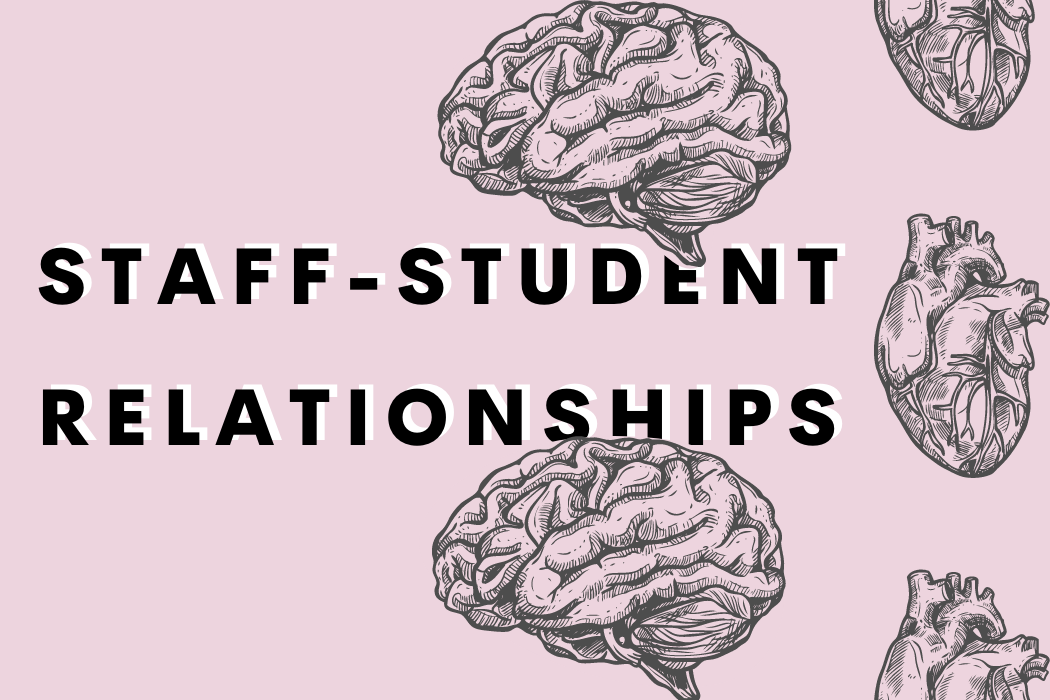
Staff-Student Relationships: Where Permissive Policy Goes Wrong
by Words by Kalli Dockrill and Margot Harvey. Art by Ayna Li Taira. | December 17, 2020
trigger warning: sexual harassment
“In our story, there’s no villain, no witch, no fairy godmother, no moral imperative or cautionary conclusion,” reads My Oxford Year, a novel by Julia Whelan featuring a romance between American student Ella Duran and her lecturer, the ‘troubled’ Jamie Davenport. Relationships between students and teachers remain an object of sexual fantasy for many. AO3, a popular site for smut and fanfiction, has 3324 stories tagged ‘professor/student,’ 118 of which are also tagged ‘non-consensual/rape. The top five of these stories boast over 40,000 hits respectively, the most popular one garnering 93,000. But there is a difference between a midnight fantasy and the reality of these relationships, which are breeding grounds for coercion, manipulation and harassment — not to mention, quite simply, poor teaching. However, at the University of Oxford, ambiguous and permissive policies leave the distinction blurry.
Between 2011 and 2017, the University of Oxford reported the most allegations of staff-on-student sexual harassment out of 120 UK universities investigated by The Guardian. The University of Oxford’s central administration reported eleven allegations of staff-on-student sexual harassment or assault between these years, while individual college statistics recorded a total of ten — although The Guardian noted possibility of overlap between the two reports. In the same timeframe, there were an additional four investigations at the collegiate level, with two staff members at Queen’s College leaving or changing their positions as a result. Although an effective reporting system may partly explain the comparatively high figures, it is clear that the University of Oxford has an issue. In response to a survey by The Isis, one student writes: “I know of an older tutor who every year would solicit attention and more from a new student.” A mere Twitter search suggests that many more allegations of harassment go unreported.
The problem results from weak University policy on sexual harassment and staff-student relationships. The current policy, developed in 2013, “discourages” but does not prohibit romantic and sexual relationships between students and the staff that hold responsibility over them. The University’s stance is out of step with policies across the US, and increasingly, the UK. UCL updated its policy at the start of 2020 to prohibit ‘close personal and intimate relationships’ where a ‘direct responsibility’ element is present. Many American Ivy League Colleges have outright bans, for example Harvard, Princeton and Yale. The latter argues that “Undergraduate students are particularly vulnerable to the unequal institutional power…and the potential for coercion.”
Policy at the University of Oxford and its colleges is the subject of significant criticism. Barrister Georgina Calvert-Lee of McAllister Olivarius commented to The Guardian that Lincoln College had a particularly permissive policy: “The one that surprised me in its blatant disregard for the weaker party was Lincoln College, Oxford, which says overtly that the reason that it wants a reporting of these relationships is to ensure it will not have an adverse effect on the reputation of the college.”
St Hugh’s is thus far the only college at the University to adopt an official policy prohibiting sexual or romantic relationships between staff and students. The principal of St Hugh’s, Rt Honorable Dame Elish Angiolini, emphasises that it was her experience defending vulnerable victims as the Solicitor General for Scotland and Lord Advocate which allowed her to see the problems with the unclear and indulgent policy. Tutorial-style teaching, according to Angiolini, requires policy which protects both parties from miscommunication, as “misunderstanding of signals is a pretty common defence.”
Angiolini mainly took issue with the ambiguity of the central policy, noting that “the policy dictated that the tutors should remove themselves from that position of power…when [these relationships] happened”. Yet the crystallization of a relationship is a process that is full of ambiguity and uncertainty: “when does a ‘relationship’ start? If someone is coming on to you, is that when you identify it [as a relationship]?”
St Hugh’s new policy on sexual harassment, adopted unanimously by their governing body, prohibits any tutor having a sexual or romantic relationship with any student over whom they have pastoral care. Angiolini explains, “I would be concerned that people think this is some type of model majority…we’re not major spoil sports…it’s as professional as possible in the 21st century and reflects what we know and understand about these relationships.”
The newly developed policy on sexual harassment was brought to the University’s central administration and presented at the Conference of Colleges. However, St Hugh’s remains the only college to have officially adopted the policy. In the wake of this failure to act, relationships between students and their teachers have become a hotly debated topic, largely due to students who demand reform.
It Happens Here Oxford, the SU Campaign dedicated to preventing sexual abuse and supporting its survivors, circulated a motion in May 2020 proposing a ban on romantic or sexual relationships between college staff members and students over whom they held teaching or pastoral responsibility. The motion, thus far, has been heard in ten JCRs. In some it was met with peer resistance. Ella Street, an It Happens Here committee member, notes that Regent’s Park’s JCR “definitely [engaged in] more discussion around the motion than I anticipated.” Yet in more JCRs it was passed smoothly. One Women’s Representative emphasised the “highly positive and constructive” experience of presenting and passing the motion, noting that “a strong student backing for communication with college [was] reassuring”.
Yet even where the student body of a college unanimously asked for protection through prohibitive policy, colleges seem reluctant to make changes. One Women’s Rep, who wishes to remain anonymous, writes that initial correspondence with her college regarding the development of more restrictive guidelines was met with a resounding “no.” On a call with the relevant staff member, she was met with recognition of the potential damage done by sexual relationships between tutors and their students, but told that cases are too complicated, especially for the post-graduate community. The college cited hypothetical scenarios such as the possibility of a member of staff being married to a student before they arrived at the college as exceptions to concerns about student welfare. The Women’s Representative was “disappointed” with the college’s decision to “downplay and deprioritise the welfare of students despite showing an awareness of how negatively these relationships could impact students.”
According to the Chair of It Happens Here, Clara Riedenstein, this reaction is not uncommon. Riedenstein lists denial on the part of colleges as one of the main obstacles to creating change. “Colleges think up hypotheticals…As far as we are concerned, these hypothetical situations have absolutely no bearing on our argument whatsoever.” The primary issue, emphasised by Riedenstein, is banning relationships between students and their tutors. These hypotheticals act as a scapegoat, allowing the problem to be dismissed without genuine engagement.
The key concern in JCRs, which was met with more student resistance, sexual autonomy. One response to The Isis’ survey reads “it is patronising and invasive for colleges to legislate the sex lives of their workers and students. Poor decisions are still decisions.” The argument for bodily autonomy stands on the legs that at eighteen students are capable of giving consent, and depriving them of this right reduces them to children. This infantilization is made more unsettling given the often gendered nature of such relationships, typically between male professors and female students. Women are sexually infantilised all too often, and paternalism with regards to their sexuality is widely considered to be rooted in patriarchal oppression. To some, limiting sexual autonomy is simply an extension of this. “There’s nothing wrong with two consenting adults sleeping together. It is not the place of the university to interfere in our private lives.”
While the age of eighteen marks legal adulthood, maturity, life-experience and the dynamics of power complicate consent. “Article 8 gives [students over eighteen] the right to consent,” says Angiolini, “but …you have to look at the power imbalances involved between the student and the tutor.” Angiolini emphasises that both parties are vulnerable, with prohibitive policies also protecting tutors from unintentionally coercing students into giving consent. Innate power imbalances mean consent can become unclear, and though the tutor may not realize it, what they perceive as casual flirting can be construed as coercion. Tutors hold inordinate power over students, responsible not only for determining grades and granting feedback, but also enrolment in the University through recommendations of rustication and suspension; whether or not they intend to, the tutor may leave the student under the impression that they have no choice. “We’re always saying ‘no means no,’” says Co-Chair of It Happens Here Kemi Agunbiade, “What if your yes is hesitant…? You’re always aware that [your tutors] have authority over you…[that] can make you feel like you have to say yes.” Any romantic or sexual relationship which occurs is not between equals due to the tutor having direct control over the student’s future.
Power dynamics are exacerbated in an environment like Oxford. Tutors are often highly-regarded in their field, while ‘imposter syndrome’ among students is rife. Inevitably, students often crave specialised attention and affirmation. Baumeister and Leary’s 1995 ‘belongingness hypothesis’ argues that individuals are fundamentally driven by a need to belong, and subsequent research emphasises that in higher education, positive teacher-student relationships are central to creating a sense of belonging.
First-year students especially show increased vulnerability to any form of attention affirming their place in the university. Equality law barrister Calvert-Lee articulates how this can develop into sexual “grooming” of students. Students will typically respond to romantic advances in a placatory way, keen not “to offend or lose the support of the supervisor.” In her opinion, Calvert-Lee says, students, especially first-year students, do not know how else to react as they are overwhelmed by the influx of new experiences, “[They might think] maybe that’s the norm here.”
Calvert-Lee emphasises that clear prohibitions also have benefits for University administrators: “it would be easier to administrate that sort of [prohibitive] policy rather than trying to work out when someone has been sexually harassed.” Calvert-Lee argues that it can be difficult to establish whether relationships are consensual, resulting in costly lawsuits against the University led not only by survivors but also by professors threatening defamation charges. Harassment is very difficult to investigate unless you are a professional investigator, a “difficult job to impose” on University administrators.
Ironically, in the conversation about consent and coercion, teaching is brushed aside. In her 2020 speech at the University College London, Oxford Law professor Amia Srinivasan said, “what is fundamentally at issue [is] whether sex with one’s student is compatible with being a good teacher.” At heart, sleeping with a student undermines a tutor’s role as an educator. “Is it too sterile, too boring, too staid to suggest that instead of sleeping with his student, this professor should have been teaching her?” The conversation becomes less about whether consent is possible and more about whether relationships, even if they are consensual, should be allowed to exist.
Srinivasan’s stance is evidence by the detrimental consequences of current policy on students’ academic careers. One response to our survey reads, “a tutor in my subject once made inappropriate comments…this tutor has a reputation for sleeping with his students [which] put me off pursuing a research project in his field…I knew that if I got a good grade everyone would assume I slept with him to get it.” Examples such as this illustrate how staff-student relationships result in the belittlement of a student’s intellect and take away from the purpose of the Oxford experience: to be educated.
Of course, some argue that banning staff-student relationships would undermine the close interpersonal relationships which are a staple of the Oxford experience. However, drawing clearer lines may allow for students to become closer to the tutor without fear of miscommunication. One student wrote: “…banning [staff-student sexual relationships] just allows me, as a student, to feel protected [by] clear boundaries within my tutorials.” Removing sex from the equation allows students and tutors to enjoy close relationship without the fear of crossed wires or college gossip.
At the postgraduate level, the pedagogical implications of staff-student relationships become more severe. Under the 2013 University policy, tutor/student relationships are permitted so long as they are declared and the student and tutor are separated. However, this separation may force a student to change the course of their academic career. Anton van der Merwe, director of graduate studies for the Sir William Dunn School of Pathology, notes that it is advised that “if there’s any conflict of interest the [student and supervisor should be] separated….”. In the Medical Sciences Division, van der Merwe says, “the student would have to leave the supervisor’s lab which would mean stopping their project.” More widely, niche areas of research and a limited number of researchers in a field mean this policy could effectively block the career path of the student; further consequences may arise where well-established supervisors have broader influence in terms of funding committees, reviewing grant applications and reviewing papers. If relationships were banned from the outset, these academic experiences for students would be protected
As the push for more effective policy increases at the collegiate level, many wonder what is truly the best way to effectively address the issue. Agunbiade notes that policies at this level leave gaping holes in the system as many students are taught by departments, some exclusively, and almost all are taught by tutors outside of their college. Van der Merwe also emphasises the need for a university-wide policy that allows for communication between all relevant parties: departments, divisions and colleges. In an ideal world, an overarching change would be “the ‘simplest’ way” forward according to Riedenstien.
Proponents of policy reform must also consider how effective the implementation of any policy of prohibition will be. In truth, a policy preventing relationships does not prevent these relationships from occurring clandestinely, nor does it ensure those who experience harassment and assault feel able to come forward. Those pushing for reform emphasise that these policies are vital to creating a culture that does not allow sexual abuse. Policy that prioritises the welfare of students in the context of sexual abuse does immense work in ensuring that survivors of harassment and assault feel safe and supported in their place of learning. “My obligation here is to make the best environment possible,” says Angiolini, a sentiment echoed by Agunbiade’s stance: “If we as colleges condemn this then at least we’re showing people that we care.”
The push from students and some administration has begun to create tentative change. Worcester College confirmed that on 17th July 2020 the College’s Governing Body voted to create a policy which would prohibit College employees from having sexual relationships with students, with exceptions to recognise the varying definitions of a ‘student’, especially at the post-graduate level. The policy has not yet been made official nor integrated into the College’s existing framework. On the divisional side, the Medical Sciences Division have changed their policy to protect post-graduate students by prohibiting relationships, and the Mathematical, Physical and Life Sciences Division are now also working to change their policy.
Angiolini tells us the fundamental reason behind the policy change at her college, St. Hughs: “There were two parallels that were beginning to converge…”, namely student activism and an administration willing and ready to make changes. Students are working hard to highlight the differences between a fantasy and fact when it comes to sleeping with your tutor. What seems sexy in theory becomes problematic when reality sets in — and arguments rooted in pedagogical shortcomings and power dynamics gone wrong make clear that all is not as romance authors may have you believe. As students and individual university entities begin to demand change, it becomes clearer and clearer that what is needed is a top-down response. It is time that the university, an institution dedicated to academic rigour, gave priority to student welfare and education over the possibility of an unproblematic love affair. As Angiolini puts bluntly, “if you’re thinking about falling in love with your tutor…don’t.”∎
Words by Kalli Dockrill and Margot Harvey. Art by Ayna Li Taira.




